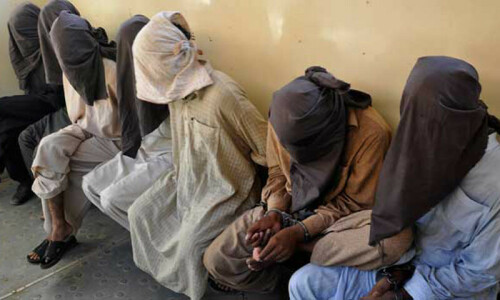Dr Mahrang Baloch, the Baloch Yakjehti Committee leader, has been featured in Time magazine’s ‘2024 Time100 Next’ list for “advocating peacefully for Baloch rights”, the magazine said on Wednesday.
The list showcases 100 young individuals “who are not waiting long in life to make an impact” and includes artists, athletes, and advocates. The magazine says the list aims “to recognise that influence does not have [requirements] … nor does leadership look like it once did”.
The magazine selected Dr Mahrang for her peaceful advocacy as well as her December 2023 march to Islamabad, where she and hundreds of women marched for “justice for their husbands, sons, and brothers”.
“I am deeply honoured and delighted to be named among the top 100 emerging leaders of the world by TIME,” she wrote in a Facebook post after receiving the recognition.
“I dedicate this recognition to all Baloch women human rights defenders and families of victims of forcefully disappeared people.”
Dr Mahrang was suddenly pushed into the limelight when she began to spearhead protests after her father, Ghaffar Longove, went missing in December 2009 from outside a hospital in Karachi.
At the time, she was still a student in primary school. The eldest of six siblings, Mahrang would burn her school books in front of the Quetta Press Club in an act of protest, demanding that her father be returned home. Her father’s mutilated body was found in 2011.
In December 2023, Dr Mahrang was one of the organisers of a large march and sit-in in Islamabad to protest enforced disappearances.
According to a report released in July, a total of 197 missing persons cases were reported in the first half of 2024 alone, with a vast majority recorded in Balochistan.
Other notable inclusions on the list were Bangladesh student leader Nahid Islam and Gazan food blogger Hamada Shaqoura.
Islam spearheaded student protests in Bangladesh over the summer, which culminated in the ouster and exile of former premier Sheikh Hasina. He is currently serving as a minister in the interim government led by Dr Muhammad Yunus.
Shaqoura, who owned a restaurant in Gaza before the conflict broke out in October, has found a platform as a “wartime food blogger”, the magazine said, adding that he cultivates recipes from ingredients found in aid packages and shares videos cooking and distributing meals in the enclave.
While saying that he was honoured by the inclusion, he said he did not “particularly feel like celebrating, in a time when me, my Palestinian people & Lebanese brothers and sisters are still facing death 24/7.
“But I’ll take the moment to emphasise to the whole world, that we —Palestinians — are here, and will always be!”































